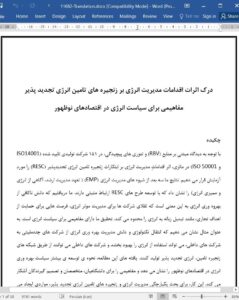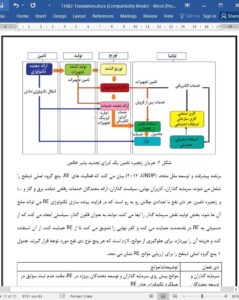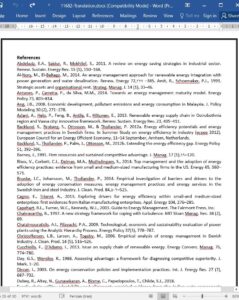Abstract
Drawing from the resource-based view (RBV) and complexity theories, we test the effects of energy management practices on renewable energy supply chain (RESC) initiatives in 151 certified (ISO 14001 and ISO 50001) manufacturing firms in Malaysia. Our results showed three dimensions of energy management practices (EMP) – top management commitment, energy awareness, and energy auditing – which were positively associated with the development of RESC initiatives. We found that insufficient knowledge of energy efficiency means firms struggle to manage energy effectively, constraining opportunities such as converting waste into energy to support business’ targets. Our work has implications for energy policy. For example, we suggest that the transfer of energy efficiency management knowledge and technology from multinational to local companies could help to improve energy usage, and that local companies could generate renewable energy through supply chain networks. The findings of this work shed light on how to further develop energy efficiency policy in emerging economies, with implications for academics, practitioners and decision-makers. This work makes the case for an integrated discussion of energy management and renewable energy supply chains.
1. Introduction
Drawing on the resource-based view (RBV) and complexity theories, in this work we test the effect of energy management practices on renewable energy supply chain (RESC) activities in the Malaysian manufacturing sector. The manufacturing industry is responsible for approximately 36% of global CO2 emissions and consumes nearly 50% of the global energy supply (Rahman et al., 2016). Based on statistics from the Asian Pacific Energy Center (APEC), CO2 emissions from energy consumption in Malaysia are anticipated to grow by around 4.2% annually, reaching 414 million tonnes of CO2 in 2030 (Hosseini et al., 2013). Developing countries such as Malaysia have focused on industrialisation to achieve higher economic growth (Li and Wei, 2015), and this industrial sector is currently searching extensively for ways to reduce energy consumption.
6.2. Limitations of this study and further developments
There are certain limitations which need to be highlighted to provide guidance to future scholars. Some organisations rejected participating in this study because they were receiving too many survey questionnaires from researchers and did not have the time and personnel to assist. Others had organisational policy constraints and thus were unable to participate in this study. Additionally, the FMM directory is not up to date on companies' details, such as some email addresses and contact numbers. In addition, the contact details provided in the directory are mostly customer service contact numbers; thus, in order to obtain senior management contact details, there is often a need to visit the respective company's website, which is time consuming. Our study did not aim to understand the main motivations of the surveyed companies in adopting sustainability practices (Paulraj et al., 2017).










